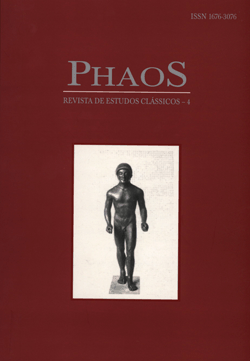Nota a Curculio IV 2. El tópico delmancipium: del dominus a las dramatis personae
Palavras-chave:
Inversion. Mancipium. Parody. Romanization. Legal topic.Resumo
Plautus is perhaps the supreme example, in the Roman literary world, of the tendency to use legal themes as metaphors and as a device of Romanization of Greek models. The Plautine corpus has twenty references to the legal theme of mancipium. This paper analyzes this theme in Curculio IV 2, in relation to two comic techniques, namely inversion and parody. Mancipium indicates the power of the dominus. Plautus, however, associates it with a leno, a figure deemed impious and faithless, and with a parasite, who engineers the trickery. Plautus thus neatly unites the elements of Romanization and satumalian inversion.Referências
EDICIÓN
T. MACCI PLAUTI. Comoediae, recognovit brevique adnotatione critica instruxit W. M. Lindsay. Oxonii e Typographeo Clarendoniano, 1959.
T. MACCIUS PLAUTUS. Curculio, édition, introduction et commentaire de Jean Collart. Paris: PUF, 1962.
WRIGHT, J. (ed.) Plautus: Curculio. Norman: University of Oklahoma Press, 1993.
INSTRVMENTA STVDIORVM
DAREMBERG, Ch. & SAGLIO, M. Dictionnaire des antiquités grecques et romaines d'après les textes et les monuments. Paris: Hachette, 1926-1929.
ERNOUT, A. & MEILLET, A. (1967) Dictionnaire étymologique de la langue latine. Histoire des mots. Paris: Klincksieck, 1967.
FERNÁNDEZ DE LEÓN, G. Diccionario de derecho romano. Buenos Aires: Sea, 1962.
GAIUS. Institutes, texte établi et traduit par Julien Reinach. Paris: Les Belles Lettres, 1950.
GAFFIOT, F. Dictionnaire latin-français. Paris: Hachette, 1990.
GAYO. Institutas, texto traducido, introducción y notas por A. Di Pietro. Buenos Aires: Abeledo Perrot, 1987.
GARCÍA GARRIDO, J. Diccionario de jurisprudencia romana. Madrid: Dykinson, 1993.
GLARE, P. (ed.) Oxford Latin Dictionary. Oxford: Clarendon Press, 1997.
LODGE, G. Lexicon plautinum. Hildesheim, New York: Georg Olms Verlag, 1971.
BIBLIOGRAFÍA
ALVAREZ, B. & GARCÍA NETTO, L "Acciones de la ley". In: LOUZAN DE SOLIMANO, N. (ed.) El procedimiento civil romano. Su vigencia en el derecho argentino. Buenos Aires: Editorial de Belgrano, 1981, p.45-64.
BAJTIN, M. La cultura popular en la Edad Media y en el Renacimiento. Madrid: Alianza, 1988.
BERGSON, H. La risa. Ensayo sobre la significación de lo cómico. Buenos Aires: Losada, 1991.
BROPHY, R. "Emancipatus feminae: a legal metaphor in Horace and Plautus". TAPhA 105, 1975, p. l-11.
CAVALLERO, P. ΠΑΡΑΔΟΣΙΣ. Los motivos literarios de la comedia griega en la comedia latina. El peso de la tradición. Facultad de Filosofía y Letras, Universidad de Buenos Aires, 1986.
CÈBE, J. P. La caricature et la parodie dans le monde romain antique des origines à Juvenal. Paris: Editions E. De Boccard, 1966.
COSTA, E. Il diritto privato romano nelle commedie di Plauto. Roma: L'Erma di Bretschneider, 1968.
CHIARINI, G. Introduzione a Plauto. Roma-Bari: Pàtron, 1991.
DI PIETRO, A. & LAPIEZA ELLI, A. Manual de derecho romano. Buenos Aires: Depalma, 1983.
DI PIETRO, A. Derecho privado romano. Buenos Aires: Depalma, 1996.
DUCKWORTH, G. The nature of Roman Comedy: a study in popular entertainment. Princeton University Press, 1952.
ECO, u.; IVANOV, v.; RECTOR, M. Carnaval. México: FCE, 1989.
LAPIEZA ELLI, A. Introducción al derecho romano. Buenos Aires: Cooperadora de Derecho y Ciencias Sociales, 1972
MOORE, T. The theatre of Plautus: playing to the audience. Austin: University of Texas Press, 1998.
PARATORE, E. "Antestor nel Curculio e nel Poenulus”. Dioniso 36, 1962, p. 98-122.
PETRONE, G. "Comunicazione ludica". Dioniso 54, 1983, p. 101-115.
PETRONE, G. Teatro antico e inganno: finzioni plautine. Palermo: Palumbo, 1991.
ROYO ARPÓN, J. Palabras con poder. Madrid: Marcial Pons, 1997.
SCAFURO, A. The forensic stage: settiling disputes in Graeco-Roman New Comedy. Cambridge: Cambridge University Press, 1997.
SLATER, N. Plautus in performance: the theatre of the mind. Princeton: Princeton University Press, 1985.
SUÁREZ, M. "Quid si adeam ad fores atque occentem? (Pl. Curc. 145): alusión y transformación en el motivo del paraclausithyron". Argos 25, 2001, p. 95-112.
VENTURA, M. "Manumisión o venganza: el dinero en Plauto". AFCXIII, 1995, p. 191-212.
WATSON, A. Rome of the XII Tables: persons and property. Princeton: Princeton University Press, 1975.
ZAGAGI, N. Tradition and originality: studies of the amatory motifs in plautine comedy. Göttingen: Vandenhoeck & Ruprecht, 1980.
Downloads
Publicado
Edição
Seção
Licença
Ao se submeterem textos para a PhaoS, seus autores devem estar cientes de que, se aprovados para publicação, a revista terá sobre eles todos os direitos autorais pertinentes. Originais não serão devolvidos.

